“How can we save the world from stories?” Michael Shermer speaks with Jonathan Gottschall about The Story Paradox: How Our Love of Storytelling Builds Societies and Tears Them Down. Gottschall reveals why our biggest asset has become our greatest threat, and what, if anything, can be done.
Tags
-
browse by topic
conspiracy theories
eSkeptic for January 18, 2022
Steven Pinker on Rationality: What it is, Why it Seems Scarce, Why it Matters
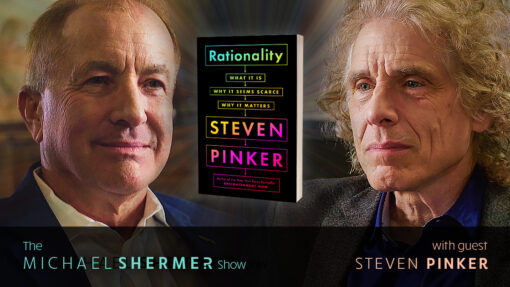
In episode 219, Michael Shermer speaks in person with Harvard psychologist Steven Pinker about his new book Rationality, about how today humanity is reaching new heights of scientific understanding — and also appears to be losing its mind. How can a species that developed vaccines for COVID-19 in less than a year produce so much fake news, medical quackery, and conspiracy theorizing?
eSkeptic for October 19, 2021
In episode 219, Michael Shermer speaks in person with Harvard psychologist Steven Pinker about his new book Rationality, about how today humanity is reaching new heights of scientific understanding — and also appears to be losing its mind. How can a species that developed vaccines for COVID-19 in less than a year produce so much fake news, medical quackery, and conspiracy theorizing?
eSkeptic for October 9, 2021
In episode 216, Michael Shermer speaks with Kathryn Paige Harden about her book The Genetic Lottery: Why DNA Matters for Social Equality. PLUS Robert Bartholomew Havana Syndrome Hysteria and the recent U.S. Government investigation into this probable psychogenic illness.
Havana Syndrome Hysteria and the Great Wild Goose Chase: Classified documents reveal skepticism of foreign actors & bolster the role of psychogenic illness

Have foreign agents been committing nefarious deeds, targeting dozens of American and Canadian diplomats and their families with an energy weapon, or is Havana Syndrome a social panic aided by sensational journalism, dubious science, and social media conspiracy theories? The contents of a U.S. Government investigation into “Havana Syndrome” released under the Freedom of Information Act, concluded that mass psychogenic illness likely played a major role.
Mike Rothschild on how QAnon became a movement, cult, and conspiracy theory of everything, based on his book The Storm Is Upon Us
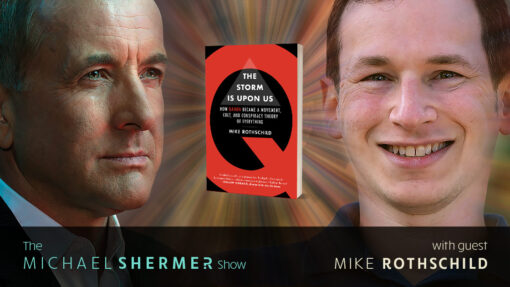
Its messaging can seem cryptic, even nonsensical, yet for tens of thousands of people, it explains everything: What is QAnon, where did it come from, and is the Capitol insurgency a sign of where it’s going next? Mike Rothschild is a journalist specializing in conspiracy theories. He has been collecting stories for years through interviews with QAnon converts, apostates, and victims, as well as psychologists, sociologists, and academics. He is uniquely equipped to explain the movement and its followers.
eSkeptic for September 28, 2021
In episode 213, Michael Shermer speaks with Mike Rothschild, a journalist specializing in conspiracy theories, about QAnon and its followers, based on his book The Storm Is upon Us: How QAnon Became a Movement, Cult, and Conspiracy Theory of Everything. PLUS, we present as a free PDF download the Memorial Tribute to Skeptic’s Art Director and Co-Founder, Pat Linse, which appeared in Skeptic 26.3 (2021).
eSkeptic for September 11, 2021
In this special episode of the podcast Michael Shermer honors the 20th anniversary of 9/11 with a commentary on the truth about that event and how it changed our lives, 7 myths about terrorism that need debunking if we are to understand how we should respond to this threat, and why we need not sacrifice liberty for security.
The Truth About 9/11 and Terrorism

In this special episode of the podcast Michael Shermer honors the 20th anniversary of 9/11 with a commentary on the truth about that event and how it changed our lives, 7 myths about terrorism that need debunking if we are to understand how we should respond to this threat, and why we need not sacrifice liberty for security.
Lee McIntyre — How to Talk to a Science Denier: Conversations with Flat Earthers, Climate Deniers, and Others Who Defy Reason
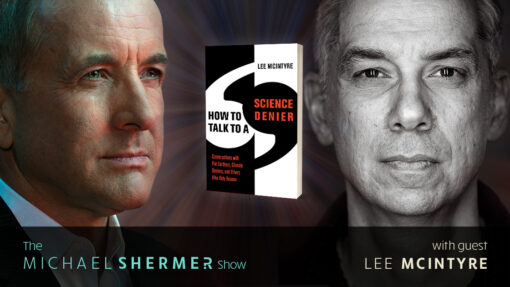
Science deniers are not merely uninformed—they are misinformed. How can we get them to change their minds and accept the facts when they don’t believe in facts? In episode 203, Michael Shermer speaks with Lee McIntyre about how to talk to science deniers such as flat earthers, climate deniers, and others who defy reason, and why it’s important to do so.
eSkeptic for August 24, 2021
Science deniers are not merely uninformed—they are misinformed. How can we get them to change their minds and accept the facts when they don’t believe in facts? In episode 203, Michael Shermer speaks with Lee McIntyre about how to talk to science deniers such as flat earthers, climate deniers, and others who defy reason, and why it’s important to do so.
Michael Gordin on the Fringe of Where Science Meets Pseudoscience
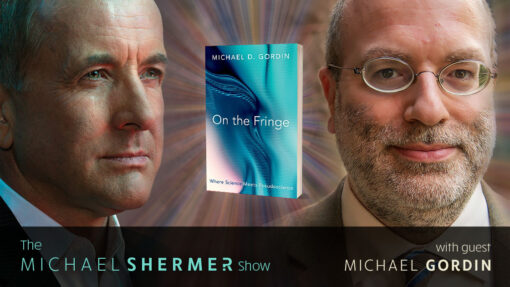
Everyone has heard of the term “pseudoscience,” typically used to describe something that looks like science, but is somehow false, misleading, or unproven. In episode 191, Michael explores with Michael Gordin the philosophical and historical attempts to address the problem of scientific demarcation.
eSkeptic for July 3, 2021
Everyone has heard of the term “pseudoscience,” typically used to describe something that looks like science, but is somehow false, misleading, or unproven. In episode 191, Michael explores with Michael Gordin the philosophical and historical attempts to address the problem of scientific demarcation.
eSkeptic for June 26, 2021
In episode 190, Michael Shermer speaks with Jonathan Rauch as he reaches back to the parallel eighteenth-century developments of liberal democracy and science to explain what he calls the “Constitution of Knowledge” — our social system for turning disagreement into truth.
Jonathan Rauch — The Constitution of Knowledge: A Defense of Truth
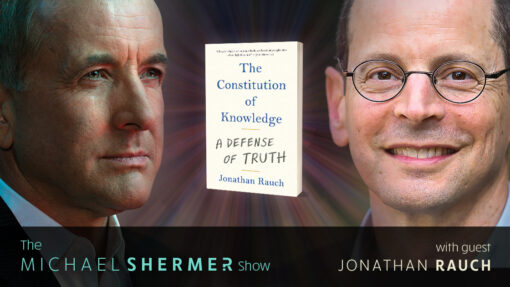
In episode 190, Michael Shermer speaks with Jonathan Rauch as he reaches back to the parallel eighteenth-century developments of liberal democracy and science to explain what he calls the “Constitution of Knowledge” — our social system for turning disagreement into truth.
Andy Norman — Mental Immunity: Infectious Ideas, Mind Parasites, and the Search for a Better Way to Think
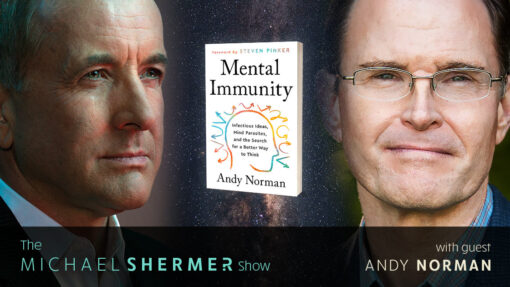
Astonishingly irrational ideas are spreading. Why? More importantly, what can we do about it? Michael Shermer and Andy Norman discuss: the plague of ideologies • memes and viruses • bad ideas as parasites • cognitive immunology • cultural immune systems • epistemology • gullibility • beliefs and values • evidence vs. faith • how to regulate beliefs, and impediments to curiosity.
eSkeptic for May 11, 2021
Astonishingly irrational ideas are spreading. Why? More importantly, what can we do about it? In episode 180 of Michael Shermer’s podcast, Michael speaks with Andy Norman about his book Mental Immunity: Infectious Ideas, Mind Parasites, and the Search for a Better Way to Think.
eSkeptic for January 15, 2021
In this cover story article (written in October 2020) for Skeptic magazine 25.4 (December 2020), Daniel Loxton considers the unsavory origins and rising threat of the QAnon conspiracy theory. Written prior to the deadly QAnon-led occupation of the Capitol Building in Washington, DC on January 6, 2021, this analysis exposes the conspiracy theory as baseless, unoriginal, and harmful for believers and society at large.
QAnon Is Just a Warmed Over Witch Panic — and It’s Also Very Dangerous

In this cover story article (written in October 2020) for Skeptic magazine 25.4 (December 2020), Daniel Loxton considers the unsavory origins and rising threat of the QAnon conspiracy theory. Written prior to the deadly QAnon-led occupation of the Capitol Building in Washington, DC on January 6, 2021, this analysis exposes the conspiracy theory as baseless, unoriginal, and harmful for believers and society at large.
eSkeptic for January 5, 2021
In episode 150 of The Michael Shermer Show, Harvard professor of human evolutionary biology Daniel Lieberman discusses his pioneering researcher on the evolution of human physical activity in his book Exercised: Why Something We Never Evolved to Do is Healthy and Rewarding. PLUS: Perhaps one of the most bizarre beliefs rampant in modern times is that malign, shape-shifting reptilian extraterrestrial invaders, disguised as human beings, secretly control the governments of the world. It is possible that we recently experienced a…
SKEPTIC App
Whether at home or on the go, the SKEPTIC App is the easiest way to read your favorite articles. Within the app, users can purchase the current issue and back issues. Download the app today and get a 30-day free trial subscription.








